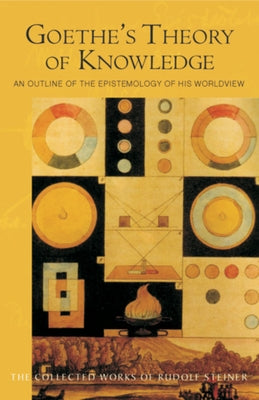Sale 10% Off Your First Order
Sale 10% Off Your First Order
Movies & TV
Toys & Collectibles
- Home
- Goethe's Theory of Knowledge: An Outline of the Epistemology of His Worldview (Cw 2)
Description
Written 1884-1885; first published 1886 (CW 2)
"Goethe's Theory of Knowledge was Steiner's first book. It is a remarkable performance, communicating the white heat, passion, and intensity of thinking that only youth's vitality can summon. 'One can write in such a seminal way only at the beginning of one's path of knowledge, ' as he says. Reintroducing it forty years later, he could say with confidence that 'as a theory of knowledge it seems to form the justification for everything I have said and published since then.' In other words, by means of the path of thinking laid down here, Steiner began the process of breaking the ground in which the seeds of spiritual science, which he would be called upon to inaugurate, could germinate." -- Christopher Bamford (introduction)As the editor of Goethe's scientific writings during the 1880s, Rudolf Steiner became immersed in a worldview that paralleled and amplified his own views in relation to epistemology, the interface between science and philosophy, the theory of how we know the world and ourselves. At the time, like much of the thinking today and the foundation of modern natural science, the predominant theories held that individual knowledge is limited to thinking that reflects objective, sensory perception. Steiner's view was eventually distilled in his Anthroposophical Leading Thoughts in 1924: "There are those who believe that, with the limits of knowledge derived from sensory perception, the limits of all insight are given. Yet if they would carefully observe how they become conscious of these limits, they would find in the very consciousness of the limits the faculties to transcend them."
In this concise volume, Steiner lays out his argument for this view and, moreover, begins his explication of how one goes beyond thinking to the observation of thinking itself.
Goethe's Theory of Knowledge is essential reading for a deeper understanding of Rudolf Steiner's seminal work, Intuitive Thinking as a Spiritual Path: A Philosophy of Freedom.
This volume is a translation from the German of Grundlinien einer Erkenntnistheorie der Goetheschen Weltanschauung, mit besonderer Rücksicht auf Schiller (GA 2). Previous translations were published as The Science of Knowing (1988) and The Theory of Knowledge implicit in Goethe's World-Conception: Fundamental Outlines with Special Reference to Schiller (1940).
About the Author
Steiner, Rudolf: - Rudolf Steiner (1861-1925) was born in the small village of Kraljevec, Austro-Hungarian Empire (now in Croatia), where he grew up. As a young man, he lived in Weimar and Berlin, where he became a well-published scientific, literary, and philosophical scholar, known especially for his work with Goethe's scientific writings. At the beginning of the twentieth century, he began to develop his early philosophical principles into an approach to systematic research into psychological and spiritual phenomena. Formally beginning his spiritual teaching career under the auspices of the Theosophical Society, Steiner came to use the term Anthroposophy (and spiritual science) for his philosophy, spiritual research, and findings. The influence of Steiner's multifaceted genius has led to innovative and holistic approaches in medicine, various therapies, philosophy, religious renewal, Waldorf education, education for special needs, threefold economics, biodynamic agriculture, Goethean science, architecture, and the arts of drama, speech, and eurythmy. In 1924, Rudolf Steiner founded the General Anthroposophical Society, which today has branches throughout the world. He died in Dornach, Switzerland.Bamford, Christopher: - Christopher Bamford is Editor in Chief Emeritus for SteinerBooks (Anthroposophic Press) and its imprints. A Fellow of the Lindisfarne Association, he has lectured, taught, and written widely on Western spiritual and esoteric traditions. He is the author of The Voice of the Eagle: The Heart of Celtic Christianity (1990) and An Endless Trace: The Passionate Pursuit of Wisdom in the West (2003). He has also translated and edited numerous books, including Celtic Christianity: Ecology and Holiness (1982); Homage to Pythagoras: Rediscovering Sacred Science; and The Noble Traveller: The Life and Writings of O. V. de L. Milosz (all published by Lindisfarne Books). HarperSanFrancisco included an essay by Mr. Bamford in its anthology Best Spiritual Writing 2000.
Related Products
You May Also Like
Recently Viewed Products
Related Products
Recently viewed products
Shopping cart
close
-
WHAT ARE YOU LOOKING FOR?Search
- Home
- Movies & TV
- Music
- Toys & Collectibles
- Video Games
- Books
- Electronics
- About us
- Castle Chronicles
- Contact us
- Login / Register



